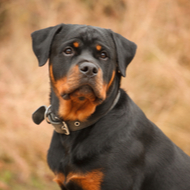New DNA testing scheme for inherited condition in Rottweilers

LEMP usually emerges in Rottweilers between one to four years of age.
The Kennel Club has approved a new DNA testing reporting scheme to tackle Leukoencephalomyelopathy (LEMP) in the Rottweiler.
LEMP is an inherited disease of the central nervous system characterised by increasing immobility. The disorder usually emerges in dogs between one to four years of age, with signs including problems walking, not walking in a straight line and dragging of the paws.
To inherit LEMP, a dog must receive two copies of an abnormal gene – one from its mother and another from its father – before its health is affected. Some dogs may receive two copies of the gene but may not go on to develop the condition.
The new DNA testing scheme has been approved following consultation with the breed’s health coordinator on behalf of the breed clubs. Affected dogs will be recorded on the Kennel Club systems as either one of the following:
Clear
The dog does not have any copies of the abnormal gene associated with the disease. The dog is highly unlikely to be clinically affected and will only pass on a normal copy of the gene to a puppy.
Carrier
The dog has one copy of the normal gene and one copy of the abnormal gene associated with the disease. The dog is highly unlikely to be clinically affected but may pass one copy of the normal gene, or one copy of the abnormal gene on to a puppy.
Affected
The dog has two copies of the abnormal gene associated with the disease. The dog will likely be clinically affected by the disorder and will pass one copy of the abnormal gene on to any potential offspring.
“The Kennel Club constantly reviews DNA testing schemes in conjunction with breed clubs to ensure that breeders are supported with resources which help them to make responsible breeding decisions,” said Dr Joanna Ilska, genetics and research manager at The Kennel Club.
“The Kennel Club works alongside breed clubs and breed health coordinators in a collaborative effort to improve the health of pedigree dogs and is happy to consider a club's request to add a new DNA test to its lists. A formal request from the breed's health coordinator or a majority request from the breed clubs is normally required to do this.”
The Kennel Club added that test results will be added to the dog’s registration details which will trigger the publication of the result in the next available Breed Records Supplement and also on the Health Test Results Finder on The Kennel Club website.
Results for dogs already tested can also be recorded, but owners will need to submit copies of the DNA certificates themselves. DNA test certificates should be scanned and emailed to health.results@thekennelclub.org.uk



 The Animal and Plant Health Agency (APHA) has updated its online reporting service for dead wild birds.
The Animal and Plant Health Agency (APHA) has updated its online reporting service for dead wild birds.